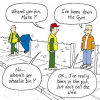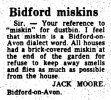Miskin was used by older people in the Black Country and Ladywood and wider Birmingham in the 1960s, often to mean dustbins, but also a rubbish heap or dung heap. The English Dialect Dictionary shows that it was used in many areas of these islands.
Various spellings and apparently from Old English.
MIXEN, sb. and v. Gall. Irel. Yks. Lan. Chs. Stf. Der.
War. Wor. Shr. Hrf. Rdn. Pem. Glo. Brks. Suf. Ken.
Sur. Sus. Hmp. I.W. Wil. Dor. Som. Dev. Also written
micksen Der.2; mixin Chs.3; mixon Lan. Chs.13 Shr.2
Ken.12 Sus.; and in forms maxen Wil.; maxon Ken.1
Sus.12; meckson nw.Der.1; mexen Lan.1 Chs.1 s.Chs.1
Stf. I.W.; mexn Lan.; misken Glo.1 Ken.1; miskin
s.Stf. War.23 s.Wor.1 se.Wor.1 Hrf.12 s.Pem. Glo.; mixtin
Wor.; ?mizen Wxf.1; mucksen Wil.; muxen Wil.1 Som.;
muxon Som. [mi·kən, me·ksən, mi·skin.] 1. sb. A
dunghill, manure-heap; a heap of ashes, refuse, &c. Cf.
maxhill.
Wxf.1 w.Yks. Watson Hist. Hlfx. (1775) 543; w.Yks.124,
ne.Lan.1, Chs. (E.F.), Chs.123, s.Chs.1, Stf. (J.T.) s.Stf. Her's
playin' on the miskin in her clane pinner, Pinnock Blk. Cy. Ann.
(1895). War. Throw it in the mixen (W.H.); Fifteen, sixteen,
Maid's in the miskin, Rhyme (T.C.O.); War.23, Wor. (W.C.B.),
s.Wor.1, se.Wor.1 Shr. Should there happen to be in one corner,
the heap known locally as the ‘mixin,’ White Wrekin (1860)
xix; Shr.12 Hrf. The making of mixens is not properly attended
to, Marshall Review (1818) II. 280; Hrf.12 Rdn. Morgan
Wds. (1881). Pem. (C.V.C.) s.Pem. Laws Little Eng. (1888)
421. Glo. To clean out miskins at nights, Evesham Jrn. (Sept. 5,
1896); Marshall Rur. Econ. (1789); Glo.1, Brks.1, e.Suf. (F.H.)
Ken. (D.W.L.); ‘That is a mixen.’ This I found to be a heap
consisting of stable manure, seaweed, and earth in alternate
layers, N. & Q. (1867) 3rd S. xii. 203; Ray (1691); Ken.1
Properly one which is made of earth and dung; or, as in Thanet,
of seaweed, lime and dung; Ken.2 Here it is more properly
restrained to an heap of earth and dung mixed together. Sur.
N. & Q. (1874) 5th S. i. 361; Sur.1 Sus. He would buy
four ounces of ‘baccer’ and sit on the mixen and smoke it out,
Egerton Flk. and Ways (1884) 15; Ray (1691); Sus.1 He sets
hisself down on the maxon ( s.v. May-be ); Sus.2 A heap of dung
and lime, or mould mixed together for manure. Hmp.1, I.W.
(J.D.R.) Wil. The mixen's good enough for thee, Ellis Pronunc.
(1889) V. 52; (K.); Britton Beauties (1825); He had dug up a
gallon of snakes' eggs in the ‘maxen,’ Jefferies Hdgrow. (1889)
169; Wil.1 Dor. (C.W.); You want one [backbone]... at the
right side for ground-dressing, and one at the left side for
turning mixens, Hardy Tower (1882) ii; Dor.1 Som. (W.F.R.);
Jennings Obs. Dial. w.Eng. (1825); Zo thay flung um on tha
mixen, Agrikler Rhymes (1872) 95. Dev. Moore Hist. Dev.
(1829) I. 354. n.Dev. Let un take Tam'sin to es mixen, Rock
Jim an' Nell (1867) st. 88.
2. Comp. (1) Mixen-heap, a dunghill; (2) Mixen-hole, a hole
for manure, dung, or refuse; (3) Mixen-varlet, a term of reproach.
(1) e.Suf. (F.H.) (2) Chs.1 (3) Gall. Keep wide from me,
mixen-varlet, Crockett Moss-Hags (1895) i.
3. Phr. better wed, or marry, over the mixen than over the
moor, prov. better marry a neighbour than a stranger from
distant parts.
Yks. ‘Better wed over the mixen as over the moor,’ as they say
in Yorkshire, Scott Midlothian (1818) xxxi. w.Yks.24 Lan.
Better [wed] over mixon than over moor, Cheth. Miscell. (1851) 6.
Chs. Ray Prov. (1678) 300; Chs.13 Dor. ‘Well, better wed over
the mixen than over the moor,’ said Laban Tall, Hardy Madding
Crowd (1874) xxii.
4. Fig. A term of reproach to a woman or child.
s.Chs.1 Yŭ lit·l mik·sn [Yŏ little mixen]. Glo. Horae Subsecivae
(1777) 273.
5. v. To clean out a stable, cow-house, pig-sty, &c.
Occas. with up. Cf. mix, v.2
Lan. Aw con mexn... as weel as onny one, Tim Bobbin View
Dial. (ed. 1740) 49; Lan.1 Chs.1; Chs.3 I'm agai't mixening up
the pigs. s.Chs.1 So metaph. of cleaning other places, which are
particularly dirty. Der.2, nw.Der.1
[1. Beggers... naked on mixens, R. Rose, 6496. OE.
myxen, dunghill (Luke xiv. 35); Mixen, meoxen, der. of
meox, mix, myx, dung (B.T.).]



